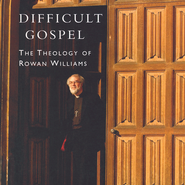Difficult Gospel: The Theology of Rowan Williams
Written by Mike Higton
Reviewed by EW
It is central to apprehending the Gospel that we embrace both its simplicity and its complexity. In the strenuous process of our spiritual journey, we often long to find a mantra, one definite articulation of our calling that will tell us clearly what we are to believe, and what we are to do. The great challenge here is to balance our desire for clarity with God’s infinite and incomprehensible potential to transform us. In Difficult Gospel, Mike Higton not only offers us a guide to the often perplexing body of Rowan Williams’ theological writings. He also inspires and enlivens us in our quest for what T.S. Eliot calls at the end of Four Quartets “A condition of complete simplicity/(Costing not less than everything).”
Higton, an Anglican theologian, researcher, and lecturer, is faithful to Williams’ conviction that theology, including his own, is never a static body of wisdom to be distilled by the enlightened and then presented for consumption by the rest of us. Not only does he effectively present the essence of Williams’ thinking on major themes, but he does so with an openness and vigor that invite us to study the Gospel as “an ongoing community of readers, argumentative and unmanageable, but therefore a community which can give us the gift of a deeper reading of Scripture” (p. 68).
In his Introduction, Higton explains what he means by calling the Gospel “difficult.” He recounts his ruminations about Williams’ theology during a long, anxious wait in an airport before an important business meeting. As he grappled that day with the attempt to capture one simple question from Williams’ voluminous, intricate, and highly learned corpus, he found illumination in a heightened presence of the people in the waiting room. He began to ask himself what difference it would make if he could absolutely believe that he and everyone in sight were “held in a wholly loving gaze” which “loved that whole tangled bundle which makes me the self I am, with an utterly free, utterly selfless love” (pp. 1‐2). To think about this is one thing, Higton writes. But “to believe such good news, such a Gospel, would have been very, very difficult” (p.2). Accepting the sheer power of this love means giving up all our preconceptions, and thus the Gospel is “good news that crucifies us” (p. 16).
The opening chapters elaborate on Williams’ conception of this love, which Higton repeatedly refers to as “disarming.” As he moves through Williams’ ideas on the Bible, the Church, politics, and sex, he shows us ways in which this disarming plays out‐‐‐by shattering whatever barriers, defenses, or distortions we may engage in because of our human need to grasp, concretize, and control.
Possibly the most powerful chapter is “Adulthood and Childhood.” The conventional concept of maturing features a movement towards certainty and independence. But Williams’ view of spiritual growth involves an acceptance of God’s boundless love in a manner which allows us to be vulnerable. To be adults, we must cease striving to be complete and satisfied, and open ourselves to the God who “constantly needles us towards knowledge of our deepest truth” (p. 101). We must accept God’s “gratuitous love which undermines and overthrows the selves we have built from defensiveness and calculation” (p.16). And we must both rest in this love and move beyond our need for autonomy and security to a life of receiving and giving, as God continually reveals to us our prospect of being His love in the world.
Higton’s work successfully shows the equipoise between simplicity and complexity. As we read, we are invited to discover not only the work of Rowan Williams but also the Gospel. We are likely to be refreshed to meet its challenges and emboldened to welcome its gifts.



